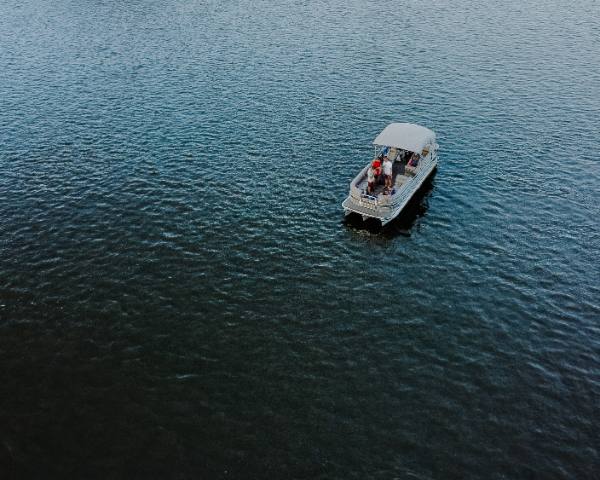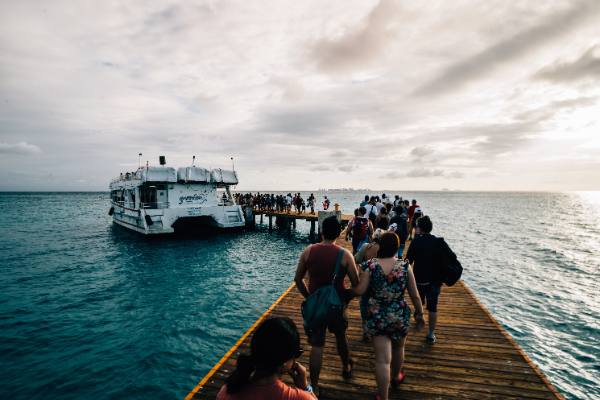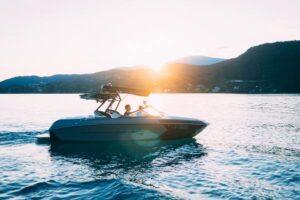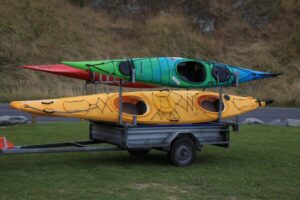When looking for a new boat, one of the most crucial factors to think about is safety. You may wonder if a pontoon or tri-toon is a safe boat before taking the plunge and buying or renting one. Despite the fact that pontoon boats can be dangerous, statistics indicate that they are 16.53% safer than other motorized boats. Read this article and you can learn more about pontoon boats’ safety.
What Is A Pontoon Boat
You’ll see many different boat types in our showroom, including pontoon boats, when you visit. The pontoons that this boat depends on in order to float are named after them.
These are typically buoyant materials in the form of logs that enable the boat to glide through the water peacefully at a slow or moderate speed.
Pontoon boats are commonly used for calm and leisurely activities like sightseeing or social gatherings because of their slower speed.
Are Pontoons Safer Than Other Boats
One of the safest boats you can buy, according to many boaters, is a pontoon. Due to their pontoon base, these boats are lightweight, simple to maneuver, and unlikely to flip over or tip over. Additionally, you can generally move around the boat as a passenger without tipping it over.
The type of boat you select does not, however, entirely determine your safety. It is up to you to act in a way that puts your safety and the safety of those around you as a priority when you are a passenger or a driver.
What Conditions Are Dangerous For Pontoons
Your pontoon could flip or capsize even though it is unlikely, but that doesn’t make it impossible.
Your boat might not ride on top of a large wave if it strikes the front of your pontoon and you are hit by it. A flip, tip, or capsize could result from this.
A pontoon boat can be sailed in some situations, just like any other type of boat. It also covers unusually harsh weather.
Your pontoon boat may not be as safe as a multi-hulled boat in certain severe weather conditions with high waves.
It should be noted that if a storm is approaching, you should make your way to land or to a safe place as quickly and safely as you can.

Tips To Keep Pontoon Boats Safe
Maintain An Even Weight Load
Make sure you maintain an even weight load on your boat and that your passengers are aware of the significance of maintaining balance on the pontoon, especially in choppy waters.
Your boat’s weight includes all of its gear, cargo, and even passengers.
Any modifications or additions you make to your pontoon may also have an impact on the weight. The center of gravity of your pontoon may be impacted by add-ons, so be sure to research this.
Your pontoon may be more prone to tipping and other potential problems if it has a center of gravity problem.
Safety Equipment
All pontoon boats ought to be outfitted with the necessary safety gear. You’ll be prepared for a variety of emergency situations if you have the appropriate equipment.
With a life ring and a rope attached to your boat, you should be able to save anyone who falls overboard. To warn nearby boats to give you plenty of room, use a swimmer in the water flag.
An anchor and line will help you stay put until help arrives if your engine fails.
If there are any additional emergencies, you should bring an emergency kit with the following items:
- Radio
- Signal flares
- Compass
- Waterproof map
- Fire extinguisher
- First aid kit
Lastly, make sure that every person on board your ship is wearing a life jacket. Yes, those who can swim well still need one. A good example is first set for any children on board. Second, they might suffer injuries or be rendered unconscious in a crash and require flotation support.
Make Modifications
You can make adjustments that will help you in rough waters if you anticipate that they’ll be a problem more frequently or if you simply want to make sure your pontoon is always safe.
Keep An Eye Out For The Weather
If at all possible, avoid being on a recreational boat during a storm. Prior to every voyage, be sure to check the forecast.
Get to safety or the shore as soon as you notice a storm coming. Your chances of not endangering yourself or your passengers increase with the speed at which you take action.
Make sure you’re aware of any potential docking issues when you’re trying to go back. It can be challenging to dock a pontoon boat during a storm because they can be big, bulky, and have a high profile.
The boat may be pushed or moved by strong winds up against the dock. Bumpers between your boat and the dock are a good idea to protect it.
Compliance With Government Rules
In Ontario, operating pontoon boats is subject to regulations. There are some driving regulations, such as who has the right-of-way when a boat is involved.
Some laws have restrictions on towing that are related to what you can do with your boat. Others relate to the qualifications of the driver, such as the insurance or boating license required to operate a pontoon.
Before using your pontoon, make sure you are following all the rules.
Defensive Driving
Making every effort to lower the likelihood of an accident is the core of defensive driving. Many of the regulations are similar to those that apply when driving a car on the highway.
The motorist must remain awake, sober, and alert. Driving while fatigued or under the influence poses a serious risk to your safety and the safety of others.
Be sure to give the other boats plenty of room as you drive. Boat collisions are a common cause of boating-related accidents. Watch out for obstacles that could harm your engine while you’re driving, like big sticks.
Although many pontoons are capable of high speeds, be deliberate in your speed. Take turns, move more slowly when you get close to other boats, etc. Drive carefully and get home before it gets too dark so you can dock in daylight.
Read: Can You Ski Behind A Pontoon Boat? Can You Wakesurf Behind A Pontoon Boat?
Bottom Line
Anyone’s safety is going to be their top concern, and you can achieve that while boating (operating the boat) by taking certain precautions. With the exception of very rough waters, pontoon boats are very safe. For boat owners who intend to spend the majority of their boating time in lakes and rivers, pontoon boats would be the best option.



